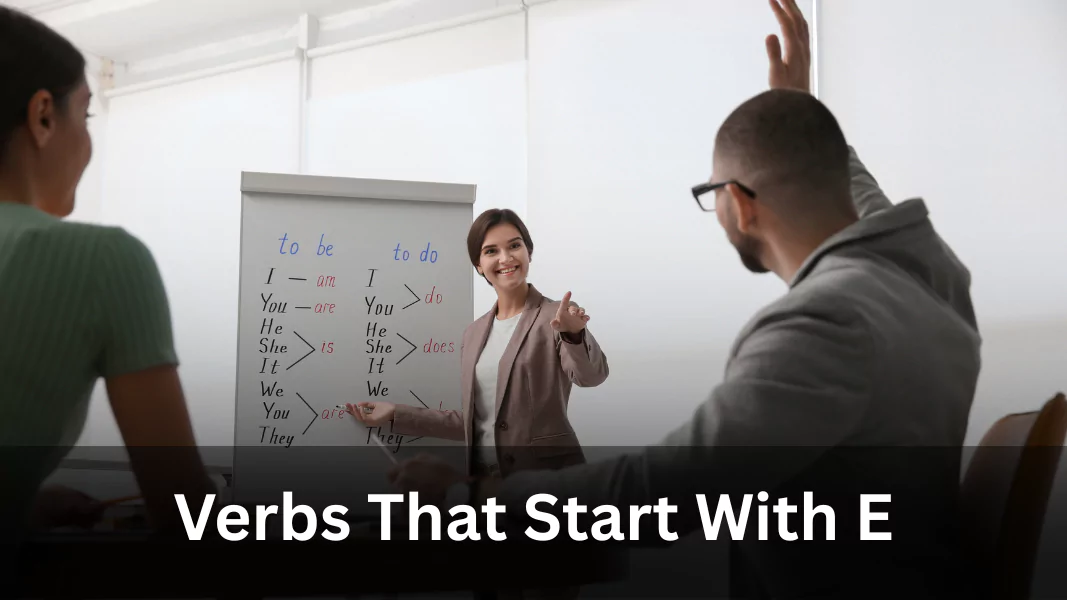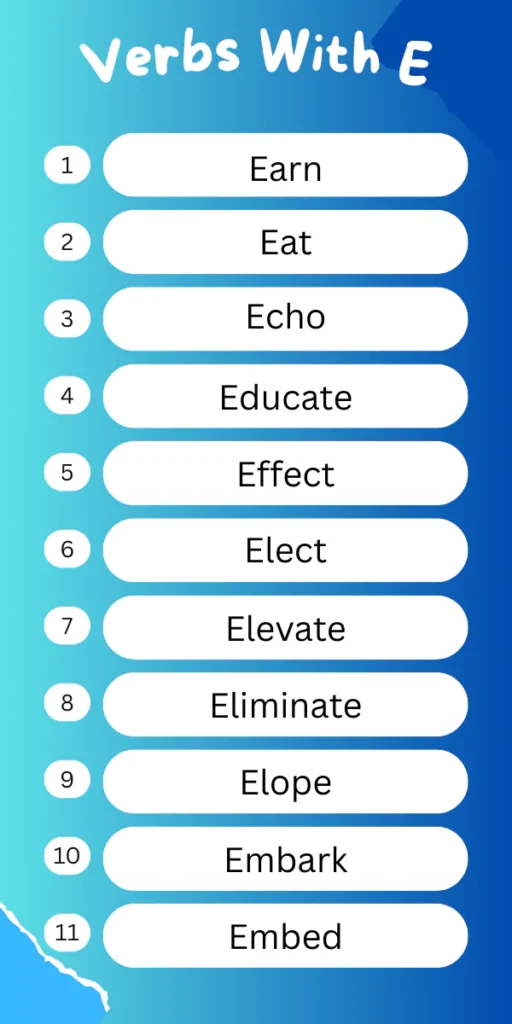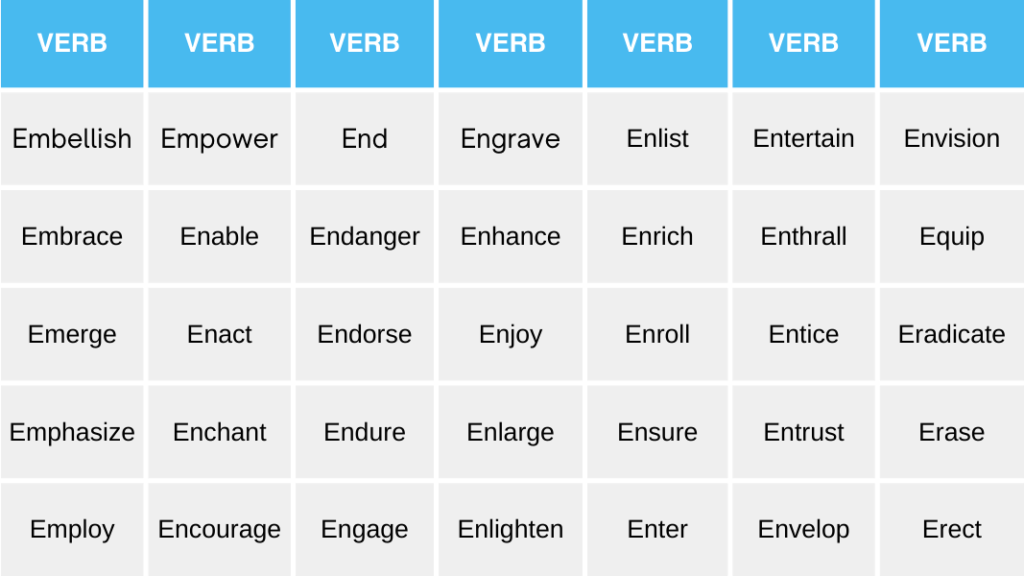Verbs That Start With E – A Complete List With Meanings

Verbs beginning with the letter E carry a unique spark that adds power and clarity to our communication. As one of the most frequently used letters in English, E introduces a wide range of verbs that express action, intention, and inspiration. From simple, everyday words like eat and enjoy to more expressive choices like empower, envision, and emphasize, these verbs help us convey ideas with precision and impact. Whether you’re writing, speaking, or simply expanding your vocabulary, learning positive and versatile “E” verbs can enrich your expression, making your messages more engaging and effective.
List of Verbs That Start With E
Verbs that begin with the letter E cover a wide spectrum of actions. These words help you communicate with clarity, whether you’re describing physical actions (eat, enter, exit), expressing emotions (enjoy, empathize), or adding power and emphasis to your writing (empower, enhance, emphasize). Learning and using these verbs will not only enrich your vocabulary but also make your speech and writing more dynamic, engaging, and effective.

Common Verbs Starting With E
These are frequently used verbs in everyday English, ideal for both spoken and written communication.
| Verb | Meaning | Example |
|---|---|---|
| Eat | To consume food | She likes to eat breakfast early in the morning. |
| Enter | To go into a place | Please enter the room quietly. |
| Enjoy | To take pleasure in something | I really enjoy reading mystery novels. |
| Explain | To make something clear | Can you explain the rules again? |
| End | To bring to a close | The meeting will end at 3 p.m. |
| Examine | To inspect closely | The doctor will examine the patient. |
| Exit | To leave a place | We exited the building through the back door. |
| To send a message electronically | I’ll email you the details later. | |
| Erase | To remove written or drawn marks | Use this eraser to erase the pencil marks. |
| Earn | To receive money or reward for work | She earns a good salary. |
| Expect | To look forward to something | We expect good results from this campaign. |
| Extend | To make something longer or bigger | They extended the deadline by two days. |
| Express | To convey a thought or feeling | He expressed his gratitude openly. |
| Exercise | To engage in physical activity | She exercises every morning to stay fit. |
| Employ | To hire someone for a job | The company employs over 200 people. |
Positive Verbs Starting With E
These verbs inspire, uplift, or motivate for persuasive or positive writing.
- Empower – To give power or confidence
Example: The program aims to empower young women. - Encourage – To give support or hope
Example: Teachers should encourage students to ask questions. - Elevate – To raise to a higher level
Example: His words elevated the mood of the team. - Enlighten – To give knowledge or insight
Example: The seminar enlightened us about climate change. - Enrich – To improve the quality of something
Example: Travel can enrich your understanding of the world. - Energize – To give energy or enthusiasm
Example: Her speech energized the audience. - Enhance – To improve or intensify
Example: Adding lemon will enhance the flavor. - Embrace – To accept willingly
Example: We should embrace new opportunities. - Emanate – To spread out from a source
Example: Warmth emanated from the fireplace. - Entrust – To give someone responsibility
Example: They entrusted him with the project. - Envision – To imagine a future possibility
Example: She envisions a world without poverty. - Esteem – To respect or admire
Example: He is highly esteemed by his peers. - Exalt – To praise highly
Example: The poem exalts the beauty of nature. - Enable – To make something possible
Example: The app enables users to track expenses easily. - Endear – To cause to be loved or liked
Example: Her kindness endeared her to everyone.
Action Verbs Starting With E
These verbs describe dynamic actions and movements, perfect for storytelling or energetic writing.
| Verb | Meaning | Example |
|---|---|---|
| Escape | To break free from something | The prisoner tried to escape from jail. |
| Engage | To participate or get involved | He engaged in a lively debate. |
| Execute | To carry out a plan or action | The chef executed the recipe perfectly. |
| Explode | To burst with force | The fireworks exploded in the sky. |
| Explore | To travel or examine in detail | We explored the cave with flashlights. |
| Erupt | To burst out suddenly | The volcano erupted violently. |
| Extract | To pull something out | The dentist extracted the bad tooth. |
| Escort | To accompany someone for protection or guidance | A guard escorted the visitors. |
| Exhale | To breathe out | She exhaled deeply after the workout. |
| Elude | To avoid capture or detection | The thief eluded the police. |
| Enforce | To make sure rules are followed | The police enforce traffic laws. |
| Enlist | To join or recruit | He enlisted in the army at 18. |
| Evacuate | To leave a dangerous place | They evacuated the building after the alarm. |
| Eject | To force someone or something out | The referee ejected the player for foul play. |
| Engulf | To surround or cover completely | Flames engulfed the entire house. |
Rare and Unique Verbs Starting With E
These less common verbs are excellent for advanced vocabulary and creative writing.
- Exemplify – To serve as an example
Example: She exemplifies leadership through her actions. - Efface – To erase or make disappear
Example: Time effaced the old memories. - Emblazon – To decorate vividly or prominently
Example: The flag was emblazoned with a golden eagle. - Excoriate – To strongly criticize
Example: The critic excoriated the play in his review. - Expostulate – To argue or protest earnestly
Example: He expostulated with his friend about the risks. - Extol – To praise enthusiastically
Example: They extolled her achievements at the ceremony. - Enrapture – To fill with delight
Example: The music enraptured the entire audience. - Evert – To turn inside out
Example: The surgeon everted the tissue during the procedure. - Enkindle – To arouse or ignite (emotion or fire)
Example: The speech enkindled hope in the crowd. - Emaciate – To become extremely thin
Example: The famine emaciated the population. - Ephemeralize – To make something more efficient or short-lived
Example: Technology ephemeralizes many manual tasks. - Envenom – To poison or make bitter
Example: His words envenomed the peaceful discussion. - Excogitate – To think out carefully
Example: She excogitated a brilliant plan. - Exsanguinate – To drain of blood
Example: The doctor treated the exsanguinated patient. - Exuviate – To shed or cast off (skin or shell)
Example: Snakes exuviate their skin periodically.
Regular Verbs That Start With E
Regular verbs follow the standard pattern of adding -ed or -d for past tense.
| Verb | Meaning | Example |
|---|---|---|
| Earn | To receive money or reward for work | She earns a bonus every year. |
| Echo | To repeat or resound | His words echoed through the hall. |
| Edit | To correct or revise text/media | She edited the article for grammar mistakes. |
| To send electronically | I’ll email you the document tomorrow. | |
| Employ | To hire or use | The company employs 500 workers. |
| Enact | To make into law | The government enacted new traffic rules. |
| Enclose | To put inside or surround | Please enclose a copy of your ID with the form. |
| Encircle | To form a circle around | Soldiers encircled the camp. |
| Enlarge | To make bigger | He enlarged the photo before printing it. |
| Enlist | To sign up for service or support | She enlisted in the volunteer program. |
| Entertain | To amuse or interest | The magician entertained the children. |
| Estimate | To roughly calculate | The builder estimated the cost at $5,000. |
| Examine | To look at closely | The detective examined the clues carefully. |
| Exclaim | To speak suddenly with strong feeling | “Wow!” she exclaimed when she saw the gift. |
| Expand | To increase in size or scope | The company plans to expand into Europe. |
Irregular Verbs Starting With E
Irregular verbs have non-standard past tense forms.
- Eat (ate, eaten) – To consume food
Example: She ate lunch quickly. - Endure (endured – rare but can act irregular in older forms) – To suffer patiently
Example: He endured months of hardship. - Excel (excelled – irregular in older English, but now regular) – To perform extremely well
Example: She excelled in her studies. - Embed (embedded – variant irregular forms exist) – To fix firmly in place
Example: The jewel was embedded in gold. - Exceed (exceeded – but historically irregular) – To go beyond a limit
Example: His performance exceeded expectations. - Escape (escaped – but had irregular use in Middle English) – To break free
Example: The bird escaped from its cage. - Elope (eloped – not classical irregular but sometimes treated so in archaic texts) – To run away secretly to marry
Example: They eloped to Paris. - Enquire (enquired/enquired – variant forms across dialects) – To ask for information
Example: He enquired about the position. - Expel (expelled, expulsion irregularity) – To force out
Example: The school expelled the disruptive student. - Enrol (enrolled/enrolled, UK/US irregularities) – To officially register
Example: She enrolled in a French course. - Equip (equipped – double consonant irregular) – To provide with necessary items
Example: The hikers were equipped with supplies. - Emerge (emerged – sometimes older irregular) – To come into view
Example: A rainbow emerged after the rain. - Ebb (ebbed – originally strong verb in Old English) – To recede or fade away
Example: The tide ebbed slowly. - Err (erred – variant irregular pronunciation) – To make a mistake
Example: To err is human, to forgive divine. - Eld (archaic irregular, from Old English) – To grow old
Example: He eld in wisdom as years passed.
Phrasal Verbs Starting With E
Phrasal verbs combine a verb + preposition/adverb to create new meanings.
| Verb | Meaning | Example |
|---|---|---|
| Ease up | To relax or reduce intensity | The boss told him to ease up on overtime. |
| Eat out | To dine at a restaurant | We decided to eat out last night. |
| Eat up | To consume completely | The baby ate up all the porridge. |
| Edge out | To narrowly defeat someone | She edged out her competitor in the finals. |
| Embark on | To begin something new | He embarked on a new career. |
| Empty out | To remove everything from inside | Please empty out your pockets. |
| End up | To finally reach a result | We ended up staying at home. |
| Engage in | To take part in something | She engaged in charity work. |
| Enter into | To formally begin something | They entered into an agreement. |
| Explain away | To dismiss a problem with excuses | He tried to explain away his mistakes. |
| Eye up | To look at with interest | She eyed up the dress in the shop window. |
| Ease into | To gradually adapt to something | He eased into his new role at work. |
| Edge in | To insert oneself gradually | She edged in a quick question before leaving. |
| End off | To finish something | Let’s end off the meeting with a thank-you. |
| Egg on | To encourage someone to do something risky | His friends egged him on to try the stunt. |
Popular & Impactful Verbs That Start With E
These verbs are widely used and carry strong or inspiring meanings, often used in speeches or persuasive writing.
- Empower – To give power or confidence
Example: The campaign empowers young leaders. - Encourage – To give support or hope
Example: Parents should encourage creativity. - Elevate – To raise to a higher level
Example: The coach’s advice elevated team spirit. - Enhance – To improve or intensify
Example: Good lighting enhances photography. - Envision – To imagine a future possibility
Example: She envisions success for the company. - Express – To convey feelings or thoughts
Example: He expressed his gratitude clearly. - Explore – To investigate or travel
Example: They explored the hidden cave. - Engage – To participate actively
Example: The teacher engaged students in discussion. - Execute – To carry out a plan
Example: The architect executed the design perfectly. - Expand – To grow or increase
Example: The business expanded internationally. - Energize – To give energy or excitement
Example: Music energized the dancers. - Embrace – To accept or welcome
Example: We should embrace change with optimism. - Establish – To set up or create
Example: The school was established in 1985. - Educate – To teach or train
Example: Schools aim to educate young minds. - Exemplify – To serve as an example
Example: Her kindness exemplifies true leadership.

Fun Facts About Words Beginning With E
- E is the Most Common Letter in English – Over 11% of all words in English contain the letter E, making it the most frequently used letter in the language. That’s why so many verbs, adjectives, and nouns start with it!
- Many “E” Words Come from Latin and French – A large portion of English words starting with E (like enlighten, empower, embrace) have roots in Latin or Old French, often carrying meanings of “to make” or “to put into action.”
- Positive Energy in “E” Verbs – A striking number of uplifting and motivational verbs start with E (empower, encourage, elevate, enrich, enlighten). This makes “E” a favorite letter for speeches, branding, and motivational writing.
- “E” Loves Prefixes – Many verbs beginning with E are created using prefixes like en- (enable, enrich, ensure) or ex- (expand, express, explore), showing how versatile the letter is in forming new action words.
- “E” Words Often Suggest Movement or Growth – Interestingly, many action-packed “E” verbs involve change, progress, or transformation (evolve, expand, emerge, embark). This gives the letter a dynamic and forward-moving energy in language.
Read: Verbs That Start With B
Read: Verbs That Start With C
Read: Verbs That Start With D
FAQs
Conclusion
Verbs that start with the letter E bring energy, expression, and elegance to the English language. From everyday actions like eat and enter to inspiring choices like empower, enlighten, and envision, these words give writers and speakers powerful tools to communicate with precision and impact. Whether you’re aiming to sound more positive, describe dynamic actions, or enrich your vocabulary with unique and rare terms, “E” verbs offer endless opportunities. By mastering these verbs, you can make your writing more engaging, your speech more persuasive, and your overall communication more effective.
